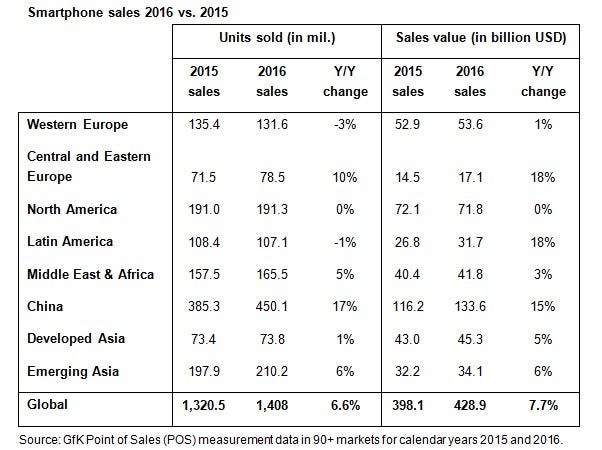Who said smartphone growth was over?Who said smartphone growth was over?
Smartphone stagnation? What stagnation? 2016's global smartphone sales are up year-on-year pretty much everywhere according to latest figures released by GfK.
February 8, 2017

Smartphone stagnation? What stagnation? 2016’s global smartphone sales are up year-on-year pretty much everywhere according to latest figures released by GfK.
Telecoms.com regularly looks to GfK as a good indicator of regional smartphone sales, and the latest numbers suggest Russia is beginning to fulfil some of the much-hyped potential when everyone bundled it into the BRIC emerging economies. The numbers say Eastern Europe, which obviously contains Russia, saw smartphone shipments grow by 10% in 2016 compared to 2015 – a growth only surpassed by the utterly unrelenting China, which grew 17% year on year.
Figures for the rest of the world aren’t particularly inspiring, but there is modest growth across most markets. Only Latin America saw a decline in sales over the course of the full year 2016, but bizarrely saw its total sales revenue go up nearly 20%. They must be slappingome hefty premiums on to their handsets over there. The good news for Latin America is that it looks as though Brazil is making a comeback after a couple of tough years economically, so GfK expects to see much more growth in the Brazilian market in 2017.
While Central and Eastern Europe begin to reach maturity, as has China, Arndt Polifke – GfK’s Global Director of Telecoms Research – rightly points out that markets across Africa and Asia are yet to fully mature. We can expect more significant growth from these markets in the coming years, and not necessarily from the usual suspects like Apple or Samsung.
“There is no other technology product that is as intensively used by consumers as the smartphone,” he said. “As a result, smartphone demand remains stable even in saturated markets. Spurred on by the impressive range of exciting innovations, such as virtual reality, artificial intelligence, smart home functionality, mobile payments and mobile health, smartphones are going to gain further relevance for consumers in developed markets. On top of this, developing regions such as the Middle East/Africa and Emerging Asia have yet to mature and as such still have significant potential for growth. These two factors lead to a solid growth outlook for smartphone demand in 2017.”
So perhaps the smartphone market isn’t so stagnant after all – mature markets have yet to decline and there is still plenty of growth to be had in other regions. Here are the numbers.

About the Author
You May Also Like










.png?width=300&auto=webp&quality=80&disable=upscale)


_1.jpg?width=300&auto=webp&quality=80&disable=upscale)